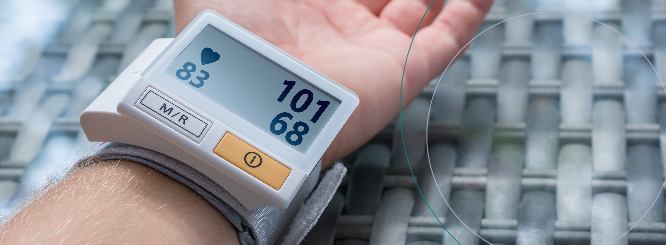
Hypertension or high blood pressure is very common among adults and children, especially in recent years. As you may have noticed from the other articles available on our website, we usually cover how certain diseases or illnesses are directly linked to obesity or being overweight. However, there are other conditions that can affect everyone, regardless of their weight. Hypertension is one of them, as it can be caused by several factors that go beyond the lack of a healthy diet or an active lifestyle.
The doors of our Tijuana clinic are always open and we receive patients with different backgrounds from both sides of the border. Our multidisciplinary team at LIMARP®, led by Dr. Liza María Pompa González, is here to help you understand the effects of having hypertension, as well as provide all the necessary tools and information to ensure that you lead a healthier lifestyle.
As always, we’d like to remind you that each case is different and the information presented in this article is general. If you haven’t been diagnosed with hypertension, make sure to visit a doctor first before taking any medication or applying drastic changes to your lifestyle. The treatment should be catered to your needs, as its main objective is to help you be healthier and avoid any life-threatening complications.
What Causes High Blood Pressure?
Hypertension, also known as high blood pressure, is a long-term medical condition in which the blood pressure in the arteries is persistently elevated[1]. This condition is usually symptom free, but when hypertension becomes long-term, it is a major risk factor for stroke, coronary artery disease, heart failure, atrial fibrillation, peripheral arterial disease, vision loss, chronic kidney disease, and dementia.
By definition, blood pressure is the measure of force against the artery walls as the heart pumps blood. There are two different types of readings:
- Systolic: The maximum pressure during a heartbeat.
- Diastolic: The minimum pressure during a heartbeat.
Normal blood pressure is considered 120 (systolic) over 80 (diastolic). Any reading over 140/90 is considered high blood pressure. Blood pressure is a great indicator of overall health because if it’s high, it can lead to heart problems and when it’s too low, it can cause dizziness, fainting, and deprive the body of oxygen, leading to heart and brain damage.
One of the reasons many people want to change their diet is because they’re struggling with high blood pressure. Most of the foods a person tends to consume are highly processed or include a ridiculous amount of salt or added sugars, and while consuming those foods once in a while is not all that bad, eating them regularly does take a toll on a person’s health. At LIMARP®, our medical team counts with licensed nutritionists that can help you achieve your goals. They go over your medical history and talk with you about your expectations to create a nutrition plan that covers all your needs.
This article will focus on how to lower your blood pressure, as well as a quick dive into what causes your pressure to increase.
Each case is different and it’s important to keep in mind the dietary restrictions you may have. However, if you suffer from any underlying issue that should be addressed in a more thorough way, we recommend you speak to your doctor before implementing any drastic changes to your lifestyle.
Symptoms of High Blood Pressure
In order to know how to lower blood pressure, it’s important to learn to identify the symptoms. As we have mentioned, hypertension is usually symptom free, but a person who wants to know how to lower their blood pressure should look out for the following:
- Blurred vision
- Nosebleeds
- Shortness of breath
- Chest pain
- Dizziness
- Headaches
There are many risk factors for high blood pressure and some of them are manageable [2], such as:
- Smoking
- Processed foods
- Drinking too much alcohol
- Being overweight
- Not exercising
Other risks factors that are not as manageable are:
- Diabetes
- Kidney disease
- Having family with high blood pressure
According to the CDC[3], high blood pressure or hypertension usually develops over time. As we have mentioned, it can happen because of unhealthy lifestyle choices and certain health conditions, such as diabetes and obesity. High blood pressure can also happen during pregnancy.
The Link Between Obesity and High Blood Pressure
There is an undeniable link between obesity and high blood pressure. For example, two-thirds of all people meeting the criteria for obesity are also at a high risk for hypertension. Being overweight affects several systems in the body, including blood volume regulation, levels of sodium, and water retention. As a result, hypertension is a common byproduct of obesity. Having this information, it’s important to consider bariatric surgery as a way to lower blood pressure.
Bariatric surgery is an excellent way to lose weight and take control of your health. In fact, several research studies have concluded that bariatric surgery is a good way to lower blood pressure.
One 2004 article stated that 75 percent of individuals with high blood pressure either improved or eliminated the issue following bariatric surgery.
A 2006 study concluded that weight loss surgery offers significant health benefits regarding hypertension. In fact, more than half of patients with hypertension who underwent bariatric surgery no longer needed their blood pressure medication after the one-year mark, meaning that they successfully lowered their blood pressure.
What Are the Benefits of Lowering Blood Pressure?
Do you want to know how to lower your blood pressure? First, it’s important for you to know that lowering blood pressure helps improve overall health. But what are the specific benefits of knowing how to lower your blood pressure? Here are some important points:
- Reduce the risk of stroke: Hypertension places excessive pressure on the blood vessels. If a vessel in the brain bursts, a stroke can occur. Being aware of this and knowing how to lower your blood pressure can help prevent a stroke from happening.
- Improve heart health: Just as high blood pressure places strain on the vessels, it also places strain on the heart. As a result, patients can have an increased risk of coronary artery disease, peripheral artery disease, angina, heart attack, or heart failure. Lowering blood pressure allows your heart to work under normal conditions, mitigating any potential damage.
- Enhance vision: Over time, high blood pressure can place strain on the optic nerve, leading to vision problems. Treating hypertension, thus lowering your blood pressure, can reduce the risk for vision issues, such as hypertensive retinopathy.
- Increase kidney health: The kidneys actually produce a hormone that aids in the regulation of high blood pressure. Hypertension damages the kidneys, resulting in a harmful cycle. Lowering your blood pressure can help prevent these issues and reduce the risk of kidney failure.
Foods to Lower Blood Pressure
The food we eat is also very important if we’re learning how to lower your blood pressure. According to the CDC[4] (Centers for Disease Control and Prevention), “permanently improving your eating habits requires a thoughtful approach in which you reflect, replace, and reinforce”. These last three words are important because they’re a reminder for you to be patient with your progress and that while quick results may be satisfying, they’re not long-lasting. They’re also not healthy and the point of reversing bad eating habits is to implement a sustainable diet that benefits all aspects of your health.
Lowering Your Blood Pressure: What to Look For and What to Avoid
Here’s a list of foods that are great for lowering blood pressure and that also make up what’s known as a DASH diet. This diet aims to include 4,700 milligrams of potassium while simultaneously reducing sodium. A 2020 study[5] proved that following this diet can help a person reduce their blood pressure levels.
- Citrus fruits, such as grapefruit, oranges, and lemons.
- Salmon and other fatty fish because of omega-3 acid found in them.
- Swiss chard due to its magnesium levels.
- Beans and lentils, a study[6] showed that they significantly lower high blood pressure.
- Carrots, celery, and tomatoes.
- Greek yogurt.
- Pumpkin and chia seeds.
Now, here’s a list of foods you should avoid to reduce the risk of increasing your blood pressure:
- Deli meat
- Frozen pizza
- Canned products, such as soups
- Processed foods with trans or saturated fat
- Alcohol
Contact Us to Learn More
If you want to learn more on how to lower blood pressure, schedule an appointment with one of our doctors. We can help determine the right treatment for you. Contact us online anytime or give us a call at (619) 373-0229.
References
[1] Naish J, Court DS (2014). Medical sciences (2 ed.). p. 562. ISBN 9780702052491.
[2] “Hypertension”. https://www.who.int/news-room/fact-sheets/detail/hypertension. (Accessed May 20, 2023).
[3] “High Blood Pressure Symptoms and Causes”. https://www.cdc.gov/bloodpressure/. (Accessed May 20, 2023).
[4] “Improving Your Eating Habits”. https://www.cdc.gov/healthyweight/losing_weight/eating_habits.html. (Accessed May 20, 2023).
[5] Christina D Filippou, Costas P Tsioufis, Costas G Thomopoulos, Costas C Mihas, Kyriakos S Dimitriadis, Lida I Sotiropoulou, Christina A Chrysochoou, Petros I Nihoyannopoulos, Dimitrios M Tousoulis, Dietary Approaches to Stop Hypertension (DASH) Diet and Blood Pressure Reduction in Adults with and without Hypertension: A Systematic Review and Meta-Analysis of Randomized Controlled Trials, Advances in Nutrition, Volume 11, Issue 5, September 2020, Pages 1150–1160, https://doi.org/10.1093/advances/nmaa041
[6] Jayalath VH, de Souza RJ, Sievenpiper JL, Ha V, Chiavaroli L, Mirrahimi A, Di Buono M, Bernstein AM, Leiter LA, Kris-Etherton PM, Vuksan V, Beyene J, Kendall CW, Jenkins DJ. Effect of dietary pulses on blood pressure: a systematic review and meta-analysis of controlled feeding trials. Am J Hypertens. 2014 Jan;27(1):56-64. doi: 10.1093/ajh/hpt155. Epub 2013 Sep 7. PMID: 24014659; PMCID: PMC5391775.


